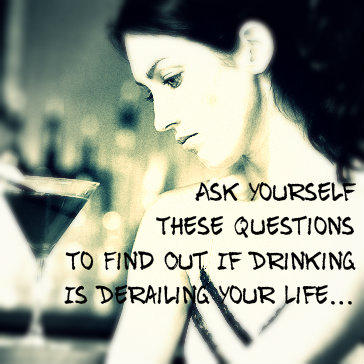Denial is a classic hallmark of addiction. Addicts cause themselves harm, they damage relationships with people they love, they get into legal trouble and financial trouble as well, and yet many will claim not to have a problem with drugs or alcohol. This is called denial, and while it is not a part of every addict’s arsenal, it is a very common defense mechanism. Until the veil of this denial can be lifted, an addict is unlikely to get help. By recognizing the signs of denial you can learn to help your loved one come to the realization that he needs help.
Is It Denial Or An Outright Lie?
 Lying is a conscious act meant to deceive. Your loved one may lie to you all the time. Lying is another defense mechanism used by addicts. To hide just how bad the problem is, he may lie to you about any number of things. To be in denial, however, is different. If your loved one is in denial, he truly believes that he doesn’t have a problem. It is frustrating to deal with an addict in denial, but realize that he is not trying to hurt you. He simply can’t see the extent of his problem.
Lying is a conscious act meant to deceive. Your loved one may lie to you all the time. Lying is another defense mechanism used by addicts. To hide just how bad the problem is, he may lie to you about any number of things. To be in denial, however, is different. If your loved one is in denial, he truly believes that he doesn’t have a problem. It is frustrating to deal with an addict in denial, but realize that he is not trying to hurt you. He simply can’t see the extent of his problem.
What Is Denial?
There are several different forms that denial can take. If you are dealing with someone who is in complete denial about his problem, he is totally oblivious to the harm that his drinking or drug use is causing. You may also be dealing with a case of partial denial. Addicts who only partially believe they have a problem may recognize that their drug use or drinking is a bad habit, but may deny the issues it is causing. Perhaps the most harmful type of denial occurs when the addict fully admits to having a problem, but denies needing any alcohol abuse help.
How Can You Recognize Denial?
Addicts are very good at behaving as if everything is fine. They strive to hide the damage that their addictions cause and present a normal face to the world. If you think your loved one is in deeper than he is letting on, look for signs that he is in denial of the severity of his problem. For instance, addicts in denial do a lot of rationalizing. He makes excuses for why he drinks or uses drugs. Maybe he says that he needs to drink after work to decompress.
Those in denial also tend to minimize their problems. Without even realizing that he is being untruthful, your loved one may tell you he had just two drinks at the bar, when he really had five. Avoidance is another denial strategy. Addicts sometimes withdraw from and avoid loved ones so they don’t have to have conversations about their behaviors. Also look out for blaming and bargaining. If your loved one blames external forces, even you, for his problem, he is in denial. He may bargain with you to let him have a few drinks if he promises not to drink the next day.
Addicts are good at denial. They deny their problem to others and to themselves. They get so good at it that denial becomes another unhealthy habit and a roadblock to getting help. If you think your loved one needs help, avoid falling into the trap of believing his denials. Trust your instincts and do your best to help him see what you see. If you fail to convince him, bring in other people who care about him and consider hosting an intervention. Addiction is a serious disease, you need to break through denial in order to get treatment and find success in recovery.
Read More About How You Can Help Someone With An Addiction
If you are overweight or obese you may wonder why you can’t seem to control your weight. Other people seemingly resist the urge to overeat and manage to get out and get exercise to stay at a healthy weight. Why can’t you? Is it a simple matter of willpower, or is there something else going on? The concept of addiction has been applied to food and obesity. Learn more about addiction to find out if your behaviors toward food may resemble those of an addict. And if they do, you can get help.
What Characterizes An Addiction?
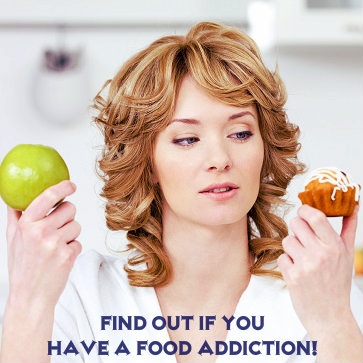 Addiction is a complicated issue and experts have debated its definition for years. Traditionally, addiction has referred only to substances, like drugs and alcohol. These substances change the brain in ways that makes it very difficult to stop using them. Characteristics of addiction include intense craving for the substance, a loss of control when using it, and the inability to stop using even in the face of negative consequences.
Addiction is a complicated issue and experts have debated its definition for years. Traditionally, addiction has referred only to substances, like drugs and alcohol. These substances change the brain in ways that makes it very difficult to stop using them. Characteristics of addiction include intense craving for the substance, a loss of control when using it, and the inability to stop using even in the face of negative consequences.
More recently, many experts have felt that it was important to include behaviors and activities in the category of addiction. These types of addictions are called process or behavioral addictions and remain distinct from chemical addictions. Some of the behavioral addictions that get the most attention include gambling addiction, sex addiction, and compulsive shopping. Any behavior or action has the potential to become a process addiction for any person. This includes eating.
What Are Addictive Behaviors?
What chemical and process addictions have in common are the behaviors exhibited by the addicted person. For instance, someone who is an alcoholic feels an overwhelming urge to drink and be drunk nearly all the time. He also loses control when drinking. He may start out one evening with a plan to have just two drinks, but end up having 10 instead. He also continues to drink in spite of the harm it is causing to his health, his relationships and his work.
If you have a process addiction you may express similar behaviors. For instance, compulsive gamblers are always drawn to gamble, whether in casinos, online or at the track. They lose control and gamble too much money. In spite of the huge losses they experience, they cannot stop gambling. The behaviors of the alcoholic and the compulsive gambler are very similar.
Do I Have A Food Addiction?
For many addiction experts, food addiction is a real problem. Consider the three characteristics of addiction: do you feel a strong and constant pull to eat? When you eat do you often lose control and eat too much in one sitting? Do you continue to eat too much even though you know that it is harming your health and that you should lose weight? If you can answer yes to these you may have a process addiction.
To know for sure just how serious your addictive behaviors are you should seek an expert opinion. There is no absolute standard for diagnosing a food addiction, but a counselor experienced in helping people with process addictions can recognize the signs in your behaviors. A therapist can also determine if your issue is a food addiction or an eating disorder.
How Can I Get Help For A Food Addiction?
There are many counselors and therapists available who understand process addictions and who are experienced in helping people like you. A trained therapist can help you understand why you overeat and can help you make constructive changes in your life. If you are unsure where to turn to find someone, see your doctors for resources. You will never regret getting help and getting your life and your health back on track.
Read More How Much Can Diet And Exercise Really Help In Recovery?
Substance addiction, which stems from the improper use of drugs or alcohol, is the classic model of physical addiction. It contrasts with behavioral addiction, a newly acknowledged form of addiction not centered on substance use. In a study published in January 2014 in the journal Drug and Alcohol Dependence, researchers from the U.S. and China compared the brain effects of one particular form of substance addiction—heroin addiction—to the brain effects of gambling disorder, the only officially recognized form of behavioral addiction in the U.S. These researchers concluded that the two conditions produce differing but overlapping brain changes.
Substance Use Disorders
Substance addiction is one of the two major components of an officially diagnosable condition called substance use disorder (which also includes serious, non-addicted substance abuse). People affected by this form of addiction experience long-term changes in their brains’ chemical status brought about by the repeated use of excessive amounts of alcohol or any one of a range of drugs or medications.
These changes occur because the brain receives enough exposure to alcohol, drugs or addictive medications to begin treating this exposure as the norm rather than the exception.
Symptoms Of Substance Addiction
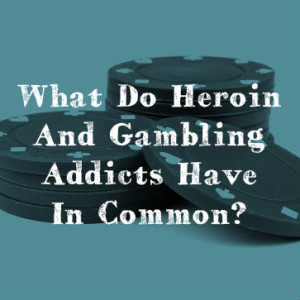 Strong and recurring urge to drink or use drugs
Strong and recurring urge to drink or use drugs- Corresponding inability to voluntarily limit substance intake
- Increasing tolerance to the effects of drugs or alcoho
- Withdrawal symptoms when the “normal” amount of alcohol or drugs is unavailable
- Destructive pattern of behavior focused primarily on substance use
Similarities Between Substance Addiction And Behavioral Addiction
Behavioral addiction produces a series of changes that mirror many key aspects of substance addiction. However, instead of stemming from excessive drug or alcohol intake, this form of addiction stems from excessive reliance on (or participation in) a specific activity.
- Strong and recurring urge to participate in a given behavior
- Inability to voluntarily limit that behavior
- Establishment of a destructive pattern of conduct focused on the behavior in question
Like substance addiction, behavioral addiction also creates long-term changes in the way the brain does its job. The American Psychiatric Association includes both substance addiction and behavioral addiction in a large grouping of conditions known collectively as substance-related and addictive disorders. There are a number of officially recognized substance-related disorders; however, as of 2014, gambling disorder (problem gambling, compulsive gambling, pathological gambling) is the only recognized form of addictive disorder.
Comparing The Brain Effects On Heroin Addiction Vs. Gambling Disorders
In the study published in Drug and Alcohol Dependence, researchers from the University of Southern California, the Chinese Academy of Sciences and China’s Guiyang Medical University conducted testing designed to compare the brain impairment of heroin addiction to the brain impairment of gambling disorder (identified in the study as pathological gambling).
Participants in this testing included 58 heroin addicts maintaining abstinence from drug use, 60 people diagnosed with gambling disorder and 60 generally healthy people unaffected by either heroin addiction or gambling disorder. Each of these participants took part in a test that assesses a critical form of short-term memory called working memory, as well as a separate test that assesses the ability to make decisions and control impulsive behaviors. The researchers compared the testing results of both the heroin addicts and the compulsive gamblers to the testing results of the healthy study participants.
They concluded that, compared to healthy people, heroin addicts experience a significant decline in their ability to use working memory, make decisions and control their actions. People affected by gambling disorder also experience problems making decisions and controlling their behaviors; however, they do not experience problems with their working memory. In addition, the researchers found that the brain impairments associated with heroin addiction grow worse over time. In contrast, the brain impairments associated with gambling disorder do not appear to grow worse or have a greater impact on people heavily addicted to gambling.
Behavioral Actions And Memory Problem Differences In Addiction
Based on their findings, the authors of the study published in Drug and Alcohol Dependence concluded that decision-making and impulse control problems appear to be central features of addiction, whether that addiction stems from a substance or a behavior. Memory problems, on the other hand, appear to be specific to substance addiction (or, at the least, heroin addiction). Further research will be needed to determine if other forms of behavioral addiction not officially recognized in the U.S. (such as sex addiction and Internet addiction) produce the same changes in brain function as gambling disorder.
Read More About The Importance Of Identifying Signs Of Substance Abuse In Bipolar Patients
Our lives today have become inextricably entwined with electronic devices. For many reasons, our cell phones, tablets and other devices have helped us. They allow us to connect more easily with others, to work on the go or work at home, and to access more information. There are downsides too. Becoming addicted to using your devices is a real possibility. We can become so dependent on them that it gets difficult to put them down or to turn them off.
 According to studies, being addicted to your cell phone is similar to other impulse control disorders, like compulsive shopping. All activities linked to our phones can lead us to use them obsessively. This includes texting, surfing the Internet, emailing and playing games. Using devices can start to take over your life, but if you are aware of the issue and your own usage, you can prevent it
According to studies, being addicted to your cell phone is similar to other impulse control disorders, like compulsive shopping. All activities linked to our phones can lead us to use them obsessively. This includes texting, surfing the Internet, emailing and playing games. Using devices can start to take over your life, but if you are aware of the issue and your own usage, you can prevent it
On reading this, you may feel immediately defensive. Maybe you don’t think you use your devices to an excessive degree. Find out just how much you are on them by keeping a log. Keep a notebook handy or a note writing app on your Smartphone, and record the time you spend doing anything on your phone, tablet or computer that is not directly related to work or actual phone calls. You may just be surprised by how much time you are texting, checking Facebook updates and Tweets, or checking on emails. Imagine what else you could do with all that time.
Can You Limit Device Use In Certain Situations?
A major irritant of modern life is when people use their phones in inappropriate situations. Checking your texts at dinner, at the movies or when in the middle of a conversation with a real, live person is inconsiderate. If you struggle to turn away from your phone in these situations, you could have a problem. Set a goal for yourself of resisting those urges. When you are with a friend or your family, tell them that you are trying to limit yourself and encourage them to call you out when you slip up. Their support will help you.
Can You Unplug For An Hour?
Test the extent of your devotion to your devices by trying to leave them alone for just one hour when you’re alone and have no one to distract you. Turn off your phone, put your tablet in a drawer, turn off your computer, and walk away. Pick up a book or magazine, bake something, watch a movie, or do anything else for an hour and see how it feels.
If you are disturbed by constant urges to check your texts, your emails, or your social media pages, you may have the beginnings of a device addiction. If you can get past those urges, however, and spend the hour avoiding your devices, it will make a difference. Try to do this once a day, and even twice a day to get some space between you and your gadgets.
Device addiction in all its forms—Internet, gaming, texting—is a real thing. You can become too attached to your gadgets and what they represent: connection. It’s OK, and even healthy, to disconnect for periods of time. Unplug and do something else and you may just find that you had been neglecting other hobbies and activities you enjoy. You may also find that you were failing to connect with people in the real world. As long as you are aware and make a point to limit yourself, you can avoid the dreaded device addiction.
Read More About Internet Risks And Addictions
If you have had a child diagnosed with attention deficit hyperactivity disorder (ADHD) you probably have a lot of questions and just as many concerns. We hear a great deal in the media about over-medicating children. What does this mean for your child and his disorder? Will using medications to help him focus put him at risk for further drug abuse, and even addiction? The answers to these questions are not simple, but the more you learn about ADHD medications and treatment, the more comfortable you will be making decisions in the best interest of your child.
How Do Medications Help Children With ADHD?
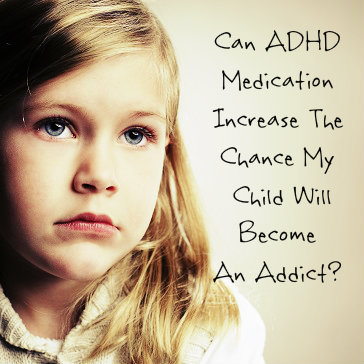 ADHD is a disorder that is characterized by difficulty focusing and paying attention, impulsive and inappropriate behaviors and hyperactivity. These often manifest during school hours making academic success a major challenge for kids with ADHD. Medications used to treat the disorder are stimulants. This may seem counterintuitive, but they dramatically reduce hyperactive impulses, and allow children to focus and pay attention. For the best results, a combination of medication and behavioral therapy is often recommended by experts.
ADHD is a disorder that is characterized by difficulty focusing and paying attention, impulsive and inappropriate behaviors and hyperactivity. These often manifest during school hours making academic success a major challenge for kids with ADHD. Medications used to treat the disorder are stimulants. This may seem counterintuitive, but they dramatically reduce hyperactive impulses, and allow children to focus and pay attention. For the best results, a combination of medication and behavioral therapy is often recommended by experts.
Are ADHD Drugs Addictive?
Stimulants used to treat ADHD, including Adderall and Ritalin, are addictive. Like other addictive drugs, they produce a pleasurable sensation related to certain brain chemicals. If these drugs are abused over time, the user can become addicted. When taken as directed, however, the risk of becoming addicted to these drugs is low.
If you monitor your child’s intake of his ADHD medications and follow your doctor’s instructions carefully, there is little chance that he will become addicted. It is natural to be concerned about the possibility. If it makes you more comfortable, keep the medication locked away and give the right dose to your child when he needs it. By controlling the administration, you can be certain he is not taking more than he is supposed to.
Does Use Of ADHD Drugs Lead To Further Drug Abuse?
There has been some debate about whether or not being medicated with stimulants for ADHD puts children at risk for later drug abuse. The best answer so far, thanks to researchers, is no. There seems to be little to no evidence that using ADHD medications as directed will lead to experimentation with other drugs, or addiction.
The greater danger results from the misuse of ADHD medications as a study drug. Teens and young adults, especially those in high school and college, abuse prescription stimulants as an aid to both studying and partying. One major reason for this abuse is that the medications have the effect of helping them stay awake. If a student needs to cram for an exam, she might take Adderall to stay up all night. Some students even take the medications to stay up late for the purpose of partying all night long. Both habits are very risky because they involve using addictive drugs without supervision from a doctor. This behavior can lead to addiction and other health problems.
Making Sure All Of Your Questions Are Answered When It Comes To ADHD Meds
The bottom line is that your child with ADHD could benefit greatly from supervised use of stimulant medications. If your doctor wants your child to try one, make sure all of your questions are answered and your concerns are addressed, but rest assured that using these drugs will not make your child an addict or a future drug abuser. Supervise your child, explain to him the dangers of abusing any kind of drug, and speak to your doctor to make sure that you and your child feel comfortable going forward with treatment.
Learn More About The ADHD And Drug Abuse Connection
27 Jan 2014
How to Avoid Substituting Your Addiction
A substitute addiction is a substance, activity or behavior that replaces a previous addiction. Acquiring a substitute addiction is not uncommon for those in recovery from drug or alcohol dependence. Being an addict takes up the biggest portion of your life.
When you are addicted to drugs or alcohol, you obsess over getting more, you earn money just so you can buy more, you try to hide your habit, and you fight with loved ones about it. In other words, addiction takes over your life. When it is gone, it may feel like you have a void in your life that needs filling. It is possible to fill that hole with positive activities and healthy relationships, but if you’re not careful, you may just slip into another addiction.
Are Substitute Addictions Always Bad?
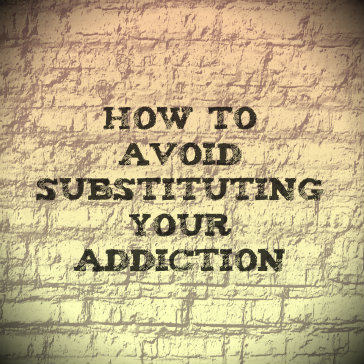 For some addicts in recovery, a substitute addiction may start out as a healthy new activity. Maybe you have taken up an exercise regimen, or you have started going to church again. Perhaps you are ready to devote yourself to your job and to getting a promotion. None of these are bad ideas, but they can become unhealthy obsessions and even approach the level of a behavioral addiction if you do not monitor your behaviors.
For some addicts in recovery, a substitute addiction may start out as a healthy new activity. Maybe you have taken up an exercise regimen, or you have started going to church again. Perhaps you are ready to devote yourself to your job and to getting a promotion. None of these are bad ideas, but they can become unhealthy obsessions and even approach the level of a behavioral addiction if you do not monitor your behaviors.
Not all addicts will develop these substitute addictions, but it is possible. There are underlying reasons you became an addict in the first place. These reasons may cause you to take up a new obsession when the first one has gone away. It is important that you find new ways to expend your energy after getting sober, but be aware of the possibility of a substitute addiction and remember that moderation is key.
How Can You Recognize A Substitute Addiction?
Because many of these substitute addictions start out as a healthy and positive new activity, it can be tough to tell when you are approaching a level of unhealthy obsession. If you became clean from prescription drugs, and then turn to drinking alcohol, the presence of a substitute addiction is obvious. Becoming obsessed with exercise or work is less so.
Listen to your loved ones and your support network. If people who care about you are telling you that you are becoming obsessed with your new hobby, you should listen. It is often easier to recognize a substitute addiction in someone else than it is to see it in yourself.
Be aware of your feelings and your motivations. If you went through a good rehab program, you learned to be aware of why you became an addict and how addiction changed your emotions and moods. If you notice similar feelings and motivations in your new hobbies or activities, it’s time to rethink what you’re doing.
How To Strike A Balance In Sobriety
Just because substitute addictions are a possibility in your new, sober life does not mean that you should not get involved in new activities. To avoid obsessing or developing a replacement for your addiction, learn to be more balanced. Instead of getting heavily involved in one activity, try several. Spread yourself out and try a lot of new things. You can always whittle your new activities down to two or three, but don’t allow all of your time to be taken up by just one.
Make sure your new activities don’t get in the way of the responsibilities you have. Make sure you keep time set aside for your relationships, your chores, and anything else you need to do. Let your loved ones help you through this process. With their support you can learn to be balanced and healthy while staying free of any kind of addiction.
Being an alcoholic means having a serious disease. Alcoholism refers to a physical dependence on alcohol. If you are an alcoholic, you experience alcohol withdrawal symptoms until you get a drink in you, you experience intense cravings for alcohol and you have developed a tolerance so that you need to drink more and more to feel the effects.
If you can’t say that all of these apply to you, yet you’ve wondered if you drink too much, you may not be an alcoholic, but you might still have a problem with drinking.
You don’t have to be a full-blown alcoholic for drinking to do its damage. Ask yourself these questions to find out if you should consider cutting back on alcohol.
Do You Drink To Feel Better?
Emotional drinking is a major warning sign. Occasionally unwinding at the end of the day with a cocktail and a group of friends is nothing to worry about, but if you need a drink to de-stress, you could have a problem. Maybe you look forward to happy hour every day because it makes you feel better and helps you relax. You should not be depending on alcohol to get you to that state of mind.
Is Your Drinking Causing Relationship Problems?
Drinking can be a major cause of stress in a relationship. Your drinking may be causing you to have more fights, it may be causing you to neglect your relationship by spending too much time out drinking, or it could be making you pass out at night and getting in the way of intimacy. Your spouse or partner might be trying to hint to you that you drink too much, or he may be telling you outright. If you get defensive immediately and refuse to change your habits, you are putting strain on your relationship.
Are You Neglecting Responsibilities Because Of Drinking?
Drinking too much may lead to some rough mornings. If this means that you are not able to get up and get your kids ready for school, or get to work on time, your drinking is interfering with responsibilities. Do you drink too much and find you can’t drive to take your kids to activities or find that you just can’t get your chores done? This is a problem and drinking is impacting your life.
Do You Drink Alone?
Drinking alone is rarely a good habit to have. If you have a drink alone every once in a while, you probably don’t need to worry, but if it is a regular occurrence, you need to rethink your drinking. You should be especially concerned if you drink alone and end up getting drunk or passing out.
Do You Feel Like You Should Curb Your Drinking But Can’t?
Maybe you have already given serious thought to your drinking. Maybe you decided that you should cut back a little so that you don’t feel so bad in the mornings or so that you have more time for your kids or spouse. Did you try to cut back and find you couldn’t do it? This is a serious sign of alcohol abuse. If you can no longer control when and how much you drink, you are headed down a dangerous path.
What To Do If You Answered “Yes” To Any Of These Drinking-Problem Questions
Any one of the signs is cause for concern. If you can answer yes to any of them, drinking is taking a toll on your life and it is time to rethink drinking. Start by talking with your partner or a close friend you trust. Having support can help you to change your habits. If that fails, consider getting professional help to make some important changes.
Read More To Find Out If Your Mom Or Wife Is Drinking Too Much
Addiction is a tricky illness, especially when it comes to behavioral addictions. Chemical addictions are straightforward. A substance—alcohol or drugs—makes chemical changes to your brain and makes it difficult for you to stop using. Clear signs of dependence emerge, such as withdrawal symptoms and tolerance. But, where do you draw the line when it feels like you might be obsessively engaging in an activity? Are you addicted? And if so, how do you stop?
What Is Social Media Addiction?
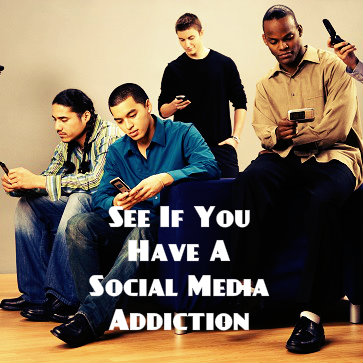 Being addicted to social media is not a condition recognized officially by the medical and addiction communities. However, there is a whole class of recognized addictive disorders called behavioral or process addictions. These refer to the compulsive and obsessive need to engage in a particular activity or behavior. It could be gambling, having sex, shopping, eating or even using social media.
Being addicted to social media is not a condition recognized officially by the medical and addiction communities. However, there is a whole class of recognized addictive disorders called behavioral or process addictions. These refer to the compulsive and obsessive need to engage in a particular activity or behavior. It could be gambling, having sex, shopping, eating or even using social media.
In our hyper-connected world in which we are all glued to devices, becoming obsessive about using them is not unusual. Social media sites like Facebook, Twitter, and Instagram allow us to keep in touch with other people, but when you keep turning to them with a burning compulsion, you may be developing a problem.
How Can I Tell If I Have A Problem With Social Media?
The line between responsible, normal use of social media and addictive use can be tricky to distinguish. It is especially difficult to see that line in your own use; it is easier to see it in others. For this reason, one sure sign that you need to rethink your usage is if someone points out your obsession. If a concerned loved one tells you that you may be turning to Facebook too often, you should listen and resist the urge to become defensive.
Another clear sign of a behavioral addiction is if you engage in the activity to feel better. If you get an emotional high or a feeling of stress relief from using social media, you are becoming dependent on it. Another sign is the experience of withdrawal. Withdrawal symptoms in chemical addictions are clear-cut and to be expected, but you can also experience them with behavioral addictions. Take notice if you feel anxious, depressed, or antsy when you can’t get to your phone or tablet to update your status.
If you find that your compulsive attachment to social media interferes with other aspects of your life, you need to reevaluate your usage. Maybe you are getting in trouble at work because you can’t stay off your favorite sites and you don’t get your work done. Maybe your relationships within your family are deteriorating because you spend too much time online. These are signs that you have a problem. Finally, if you recognize that you are online too often, try to cut back and find that you can’t, you may be addicted.
How Can I Get Help For Social Media Addiction?
As with any addiction, professional help and support of loved ones are the keys to recovery. As more people face the problem of overusing technology, more professionals are available to help you cope and come clean. Find a therapist or counselor who has experience working with people who have behavioral addictions. Also consider finding a support group that can help you deal with your problem by relating to others in the same situation. Enlist the support of your loved ones to help you get through this, and you will be successful.
Read More About Why Internet Addicts Are More Likely To Abuse Drugs And Alcohol


